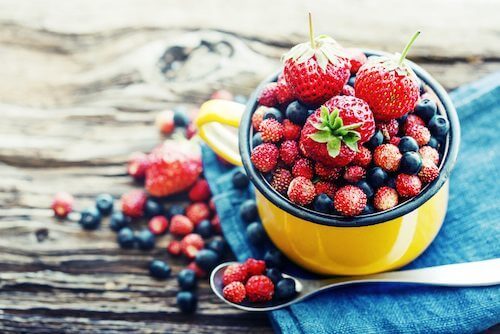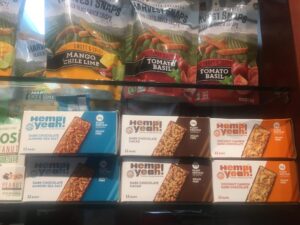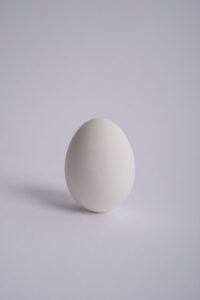Did you know that choosing the right foods for vein health can improve your circulation? That's important because your body’s circulatory system stretches over 60,000 miles long. And it plays an integral role in maintaining your overall health. Keeping it strong and nourished is vital for managing or avoiding venous diseases—including varicose veins—as well as for living a long and healthy life.
Thankfully, nourishing your veins is easier than you might think. A daily dose of moderate exercise combined with following these three diet tips will ensure that you and your veins are keeping your body’s circulatory system strong.

What do rainbows have to do with your veins? Bioflavonoids, also known as Vitamin P, are the source of vibrant colors in certain fruits and vegetables. More significantly, Vitamin P also helps protect these fruits and veggies against microbes and insects. Studies have proven that a long-term diet rich in bioflavonoids not only improves the appearance of varicose veins, it also strengthens the walls of your blood vessels. And when those blood vessel walls are strong, veins are subject to much less of the stress that leads to and exacerbates venous diseases. When searching for foods high in bioflavonoids, look for brightly colored fruits and veggies like red bell peppers, oranges, strawberries, spinach, and peaches.
While you're at it, consider adding the seeds of grapes to your diet. (Or, more specifically, an extract made from these seeds.) Why eat the seeds, which don't have all that vitamin-rich coloring? According to a study in the journal Medicine, consuming two daily doses of grape seed extract boosted blood flow to varicose veins, improving pain and swelling.
You’re probably aware of the digestive benefits of a high-fiber diet. But did you know that fiber can also help strengthen your veins? Soluble fiber, the kind that can't be digested, stays intact when passing through your intestine and prevents constipation. Frequent constipation puts a large amount of undue stress on your veins. Foods that are high in fiber include oats, buckwheat, peas, apples, and berries.
Some nuts and seeds are also packed with fiber. And they'll offer additional support thanks to their B3 and niacin content, both of which fight inflammation. Top choices include hemp, chia, flax, sunflower, and pumpkin seeds.
If you have trouble incorporating these foods into your diet, mixing flavorless psyllium powder into your morning glass of tea or water works just as well. Keep in mind that drinking a sufficient amount of water is a necessary accompaniment to a high-fiber diet because it ensures that the fiber will be pushed through your system.

Perhaps the most important dietary tip for healthy veins is to eat foods that are high in Vitamin C. This is because Vitamin C keeps veins toned and has been proven to help improve circulation. Luckily, many foods that are high in Vitamin P are also good sources of Vitamin C. These include fruits like oranges, oranges, tangerines, mangos, grapefruits and papayas. Vegetables such as spinach, broccoli, kale, and bell peppers are also rich in Vitamin C. When consumed together with vitamin E, Vitamin C’s effects on veins are said to be even more pronounced. For your daily dose of Vitamin E, reach for almonds, peanuts, or avocado.
Like brightly colored fruits and veggies, cocoa is rich in flavonols. In fact, cocoa flavanols, including epicatechin, can help people with Peripheral Artery Disease walk more comfortably. More specifically, cocoa can help target therapy directly to your legs (limb perfusion) and improve cell and muscle regeneration in your legs. So grab a cup of hot cocoa, just make sure it's cocoa powder with a concentration higher than 85%.

We've long heard that eggs up your cholesterol. And cholesterol can be a problem when it comes to your arterial health. But here's the story: eggs are also loaded with vitamins, minerals and protein. And, according to a new study, this combination boosts heart-healthy metabolites in your body. In turn, that upped HDL levels in your blood, helping clear out cholesterol from your arteries and veins.
Now, earlier studies said that eating just half an egg a day increased your risk for heart disease by 6%. So, the jury's still out on this favorite breakfast staple. But, for now, the latest evidence suggests that adding one egg to your daily diet should do more good than harm.
While your diet can support healthier veins, beverages can, too! Consider sipping on green tea, since it's packed with Epigallocatechin-3-gallate (EGCG), a compound that could prevent plaque build-up and vessel constriction. And while you're at it, be sure to drink your water, too, since staying hydrated supports optimal circulation and could even reduce symptoms of edema.
If you want to protect your vein health, watch your sugar consumption. That's because processed sugar takes a toll on your blood vessels.
In fact, studies show that built up glucose can make your blood vessels contract more than they should. (It's part of why diabetics have to worry about their blood flow.) Why does sugar in your blood constrict your vessels? Sugar inflames your nerves and blood vessels. That makes it harder for them to work well, so blood can pool, stretching out your veins and stopping them from closing properly. And those issues can translate to varicose veins, and aching, swollen legs and ankles.
The key takeaway here is that preventing varicose veins starts with proper nutrition. The best foods for varicose veins are those rich in bioflavonoids, fiber and vitamins. According to our vein specialists in Houston & Dallas, if you want healthier veins, replace junk food with a fresh and balanced diet rich in fiber and flavonoids. Add in some exercise (for inspiration, check out our Move it Monday series) and you'll be on the path to stronger, healthier veins.

Scheduling
Please contact our dedicated specialists to schedule a consultation today.
2025 Texas Endovascular. All rights reserved. Website Design by Healthcare Success